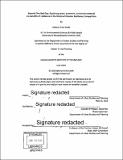Beyond one bad day : exploring social, economic, and environmental co-benefits of resilience in the National Disaster Resilience Competition
Author(s)
Keefe, Kathryn Erina
DownloadFull printable version (17.32Mb)
Alternative title
Exploring social, economic, and environmental co-benefits of resilience in the National Disaster Resilience Competition
Other Contributors
Massachusetts Institute of Technology. Department of Urban Studies and Planning.
Advisor
David Hsu.
Terms of use
Metadata
Show full item recordAbstract
Despite the rise in extreme weather events, communities in the U.S. tend to underinvest in disaster risk management and resilience efforts. This is due in part to prohibitively high costs, which are not justified by the traditional method of determining the benefits of such investment. The benefits of resilience are often unclear, distant, and limited to a narrow understanding of a project's impact. Infrastructure and program investments can offer social, economic, and environmental co-benefits that extend beyond a project's disaster risk reduction and help to meet community needs every day, not just during the rare occurrence of a disaster. Decision-makers need a way to incorporate co-benefits into the evaluation of these investments. However, a standard methodology to assess quantitative and qualitative value of community resilience co-benefits does not exist. The Department of Housing and Development offered a way to resolve the current disconnect between project costs and benefits in a novel requirement for the one-time National Disaster Resilience Competition (NDRC) of 2014-2015. The NDRC required forty U.S. state, county, and city applicants to develop a qualitative benefit-cost analysis (BCA), encouraging consideration of the hard-to-quantify benefits. This thesis analyzes the perception of social, economic, and environmental co-benefits by these communities as reported through the competition BCAs. It examines which co-benefits were identified across proposals and to what extent assessment methodologies were applied to quantify them. The findings and recommendations in this thesis build the foundation of a standard framework for resilience co-benefits. Through adaption of the traditional BCA model, decision-makers will ultimately be empowered to strengthen the case for resilience investment in their communities.
Description
Thesis: M.C.P., Massachusetts Institute of Technology, Department of Urban Studies and Planning, 2018. Cataloged from PDF version of thesis. Includes bibliographical references (pages 64-66).
Date issued
2018Department
Massachusetts Institute of Technology. Department of Urban Studies and PlanningPublisher
Massachusetts Institute of Technology
Keywords
Urban Studies and Planning.